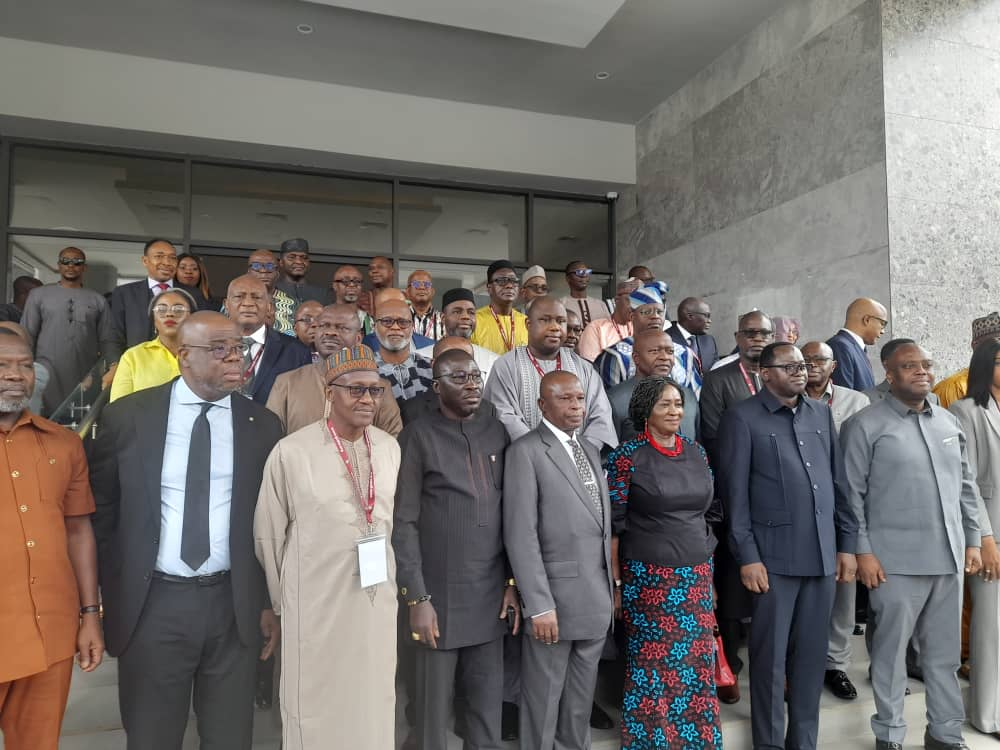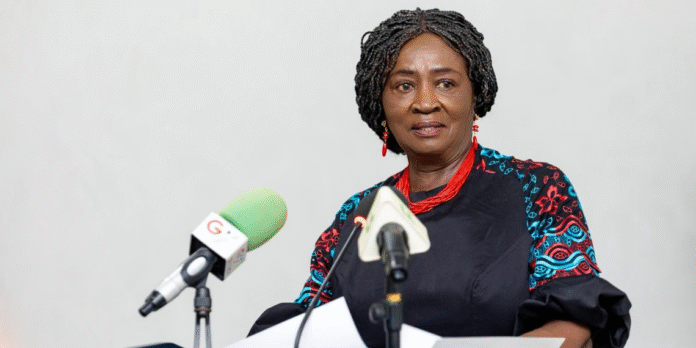Vice President, Prof. Naana Jane Opoku-Agyemang
The Vice President, Professor Naana Jane Opoku-Agyemang, has urged ECOWAS member States to unite in combating Money Laundering (ML), Financing Terrorism (FT) and all Illicit Financial Flows (IFFs) to safeguard regional stability and economic integrity.
“As leaders, our responsibility is to ensure that our regional architecture for combating ML, FT and weapon proliferation remains robust, inclusive, and forward-looking. This is critical to enhance security and sustain development in the West African sub-region,” she said.
Vice President Opoku-Agyemang said this when she opened the Second Extraordinary Inter-Governmental Action Group Against Money Laundering in West Africa (GIABA) Ministerial Committee (GMC) meeting in Accra.
It brought together key policymakers, experts and leaders from across the West African sub-region to discuss their shared commitment towards safeguarding the integrity of the region’s financial and economic systems and expanding the frontiers of cooperation.
The meeting would also look into the merit of admitting Burkina Faso, Mali and Niger (Alliance of Sahel States, or the AES) into GIABA as non-ECOWAS countries.
The Vice President explained that IFFs and related crimes often thrived under weak coordination and fragmented institutional presence, which was why discussions around deepening engagement with all parts of ECOWAS, including those currently undergoing political transition, had become critical.
She said that although the current political transitions in parts of the sub-region posed complex governance and security challenges, they had reignited important conversations on the need for regional cohesion, enhanced institutional engagement, and the shared fight against transnational threats.
The Vice President stated that discussions about the roles and status of the AES within GIABA member States raised further questions around protecting the entire region, closing gaps in intelligence, reinforcement, and balancing standards with solidarity.

These questions were worth tackling in the spirit of regional unity and resilience and required prudence, patience and principled dialogue, she said.
She expressed confidence in the Committee’s ability to remain guided by a commitment to strengthening regional cooperation, recognising their interdependence and the belief that every country in the region had a key role to play in building a secure and prosperous future.
Prof. Opoku-Agyemang commended GIABA for its commitment to ensuring that its member States adopted adequate measures against ML, TF and weapon financing in line with acceptable international practice and standards and to safeguard and protect the integrity of economies across West Africa.
“Your work, often behind the scenes, is of great importance to regional security and sustainable development,” she said.
Mr Edwin W. Harris Jnr, the Director-General of GIABA, highlighted the importance of continuous relations with AES countries for intelligence sharing, transaction monitoring, and collective efforts to track and disrupt all terrorists’ funding networks.
He announced the successful exit of Mali from the Financial Action Task Force (FATF) grey list in June 2025, while Nigeria and Burkina Faso were expected to make significant progress by the committee’s next review meeting.
He also gave information on GIABA’s continuous progress within the global network after its exit from the FAFT Effectiveness Improvement Programme, and these included Senegal’s invitation in 2024, to serve as a guest member of the FAFT for a year, showcasing the positive efforts being made by the region.
In the same vein, Nigeria had been invited to sit as a guest member spanning from October 2025 to October 2026, he said and thanked the GMC for supporting the GIABA secretariat and its member States.
He paid tribute to the immediate past Chairman of the GMC, Mr Lateef Fagbemi, the Minister of Justice and Attorney-General, Nigeria, for his great stewardship and hard work during his tenure.
Mr Thomas Nyarko Ampem, Ghana’s Deputy Finance Minister, highlighted the devastating impact of IFFs on economic stability, governance structures, and social development.
He acknowledged GIABA’s central role as a specialised ECOWAS institution in coordinating regional efforts to combat these threats through robust policy development, technical support, and mutual evaluations.
Mr Ampem said the meeting would allow participants to carefully consider the implications of the proposed membership of AES countries within GIABA’s framework, and urged members to approach the discussion with vision, strategy and a commitment to inclusiveness, to strengthen the regional mechanisms and promote a united and resilient ECOWAS community.
He reaffirmed the Finance Ministry’s resolve to support GIABA’s work, particularly in promoting sound financial governance, an effective regulatory framework, and international cooperation.
Mr Sheku Fantamadi Bangura, the Minister of Finance, Sierra Leone, who now chairs the GMC, pledged his full commitment to work with all Committee members to advance GIABA’s vital mission and the GMC as the Group’s supreme decision-making body under its statutes.
He suggested, among others, that GIABA’s strategic focus must shift from technical compliance to demonstrable effectiveness in combating financial crimes, saying it was only through collective resolve and sustained partnerships that they could build a secure and prosperous West Africa, resilient against illicit finance.
Ambassador Mohammed Lawan Gana, the Special Representative of the ECOWAS President to Ghana, noted that the corrosive impact of terrorism and violent extremism, the rise of transnational organised crime, and the political complexities arising from their withdrawal, were developments “not only to test our unity: they strain the foundations of our regional integration project and challenges our collective resolve.”
He suggested that countries look inward by addressing the root causes of illicit financial flows, including weak governance, endemic corruption, declining value systems, and lack of transparency.
DISCLAIMER: The Views, Comments, Opinions, Contributions and Statements made by Readers and Contributors on this platform do not necessarily represent the views or policy of Multimedia Group Limited.
DISCLAIMER: The Views, Comments, Opinions, Contributions and Statements made by Readers and Contributors on this platform do not necessarily represent the views or policy of Multimedia Group Limited.


